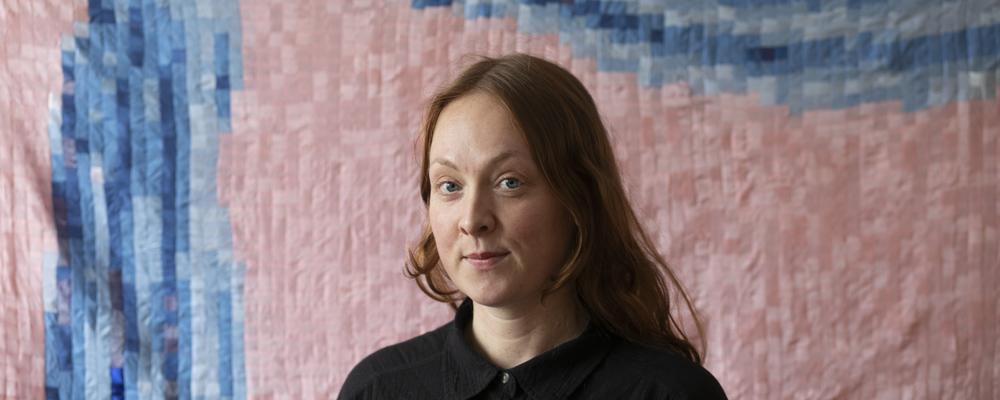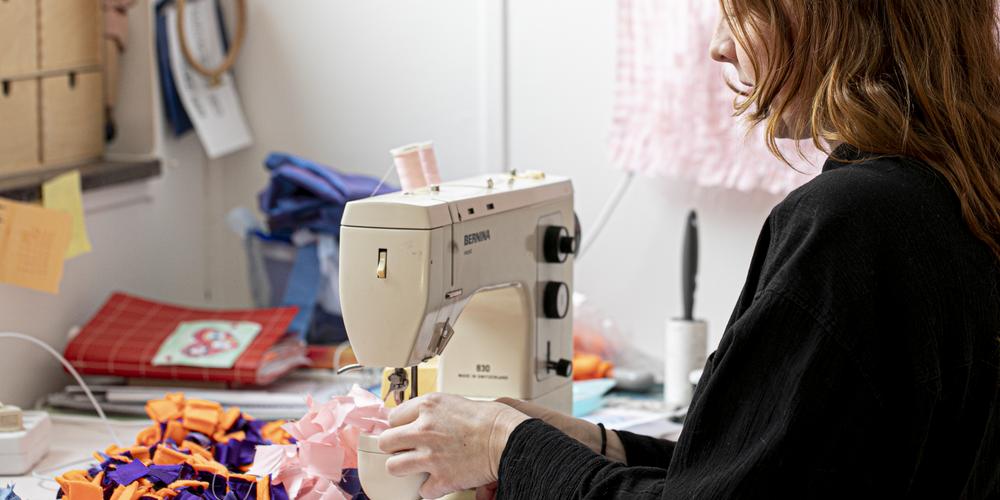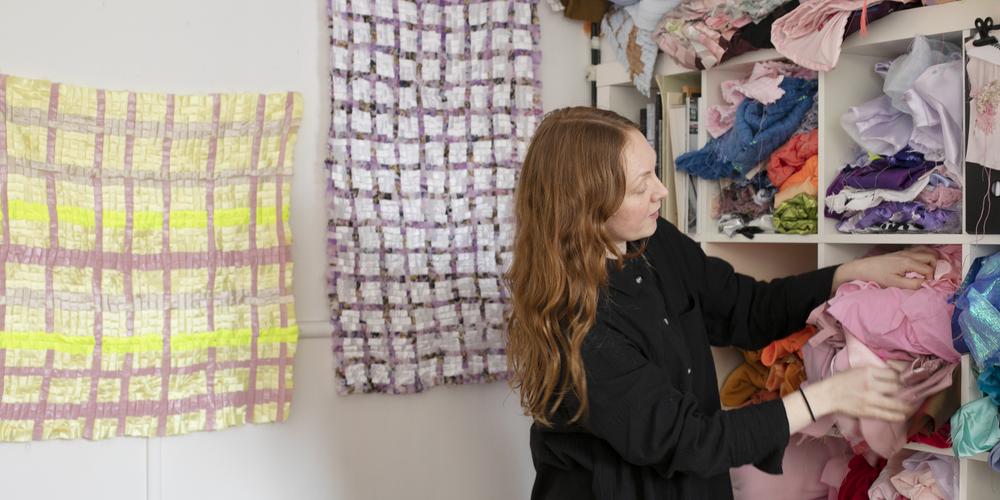
- Home
- News and events
- Find news
- At HDK-Valand, Ellen’s passion for aesthetics took centre stage
At HDK-Valand, Ellen’s passion for aesthetics took centre stage
She has just had her first solo exhibition at Nääs Castle and School of Crafts. Galleries in both Oslo and Gothenburg are next on the agenda. Six years after graduating from HDK-Valand with a master’s degree, Ellen Dynebrink has established herself as a textile artist who focuses entirely on patchwork.
Outside, there’s a chill in the air. But inside the studio it’s warm and welcoming. This is where Ellen Dynebrink does her work, examples of which hang on the walls around her. All of them have been made with the combination of patchwork and shiny, fluffy fabrics that has become her signature.
“For me it’s about creating value,” says Ellen. “It’s about the hierarchies within art and materials. I mostly use fabrics that I associate with my childhood in the 1990s – fabrics that aren’t usually considered good enough to work with, especially in time-consuming techniques like patchwork.”
Patchwork does indeed take time. First, she creates a digital model of the piece by combining images on the computer. Then she gets to work cutting squares and sewing. She has calculated that 400 squares take about two hours of work.
“And you can’t really sew for more than six hours a day,” says Ellen. “It’s demanding work. If I sit and sew for that long, I’m pretty wiped out afterwards.”

And yet it’s patchwork that has become her chosen art form. She has done weaving and embroidery as well, but in patchwork, or quilting, many of the things that interest her most come together. Things that provoke ideas about gender and feminism. Subjectivity and objectification – and everything in between.
“For me it was the history of quilting, with its tradition of community and the collective, that drew me in from the beginning. During my thesis project, I also had an advisor who encouraged me to continue with patchwork – who said, ‘Go on!’”
Ellen’s dream of working as an artist took hold when she was still a little girl. When she was eight, the plan was to become “a background dancer, actor or artist”.
“My mother teaches textiles and my father is a finish carpenter,” she says. “Although I got into creative work in a different way, I grew up in an environment where creativity and the joy of making things was taken seriously – where it could become my life’s work and not just a hobby.”
In other words, applying to a preparatory art school was a natural next step after finishing upper secondary school. Ellen chose graphic arts, and that opened her eyes to the field of textile design in Borås. But after getting half-way through that programme, she realised she didn’t want to continue on the track of becoming a designer.
“I didn’t like having my aesthetic passion constrained by which colours were trending for the upcoming season,” she explains. “I wanted to be able to experiment freely, so it seemed obvious that I needed to apply to HDK-Valand’s MFA programme in textile art.”

During the second year of the master’s programme, she gave birth to her daughter Vanja. That meant putting her studies on hold and taking parental leave. But a year later she was back in school.
“Actually, it was no problem at all,” she says. “Because many of the students have already earned other degrees and are approaching thirty when they start at HDK-Valand, many of them have children. I felt like there was a lot of understanding for my situation, including from the faculty.”
Ellen even thinks that becoming a parent helped her to focus – especially during her work on her thesis project. She says it made her more appreciative of the hours she had for working. “When other students were taking two hours for lunch, I had fifteen minutes,” she says.
The time at HDK-Valand gave her a group of close friends as well as a legitimacy that still benefits her, like when she applies for work stipends.
“Having a master’s degree gives you self-confidence,” says Ellen. “It’s proof that you’re highly educated in your field. Having that proof on paper does something to you.”
By Camilla Adolfsson
More information about Ellen Dynebrink: https://ellendynebrink.se/

